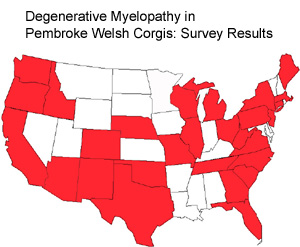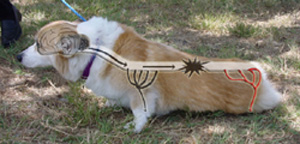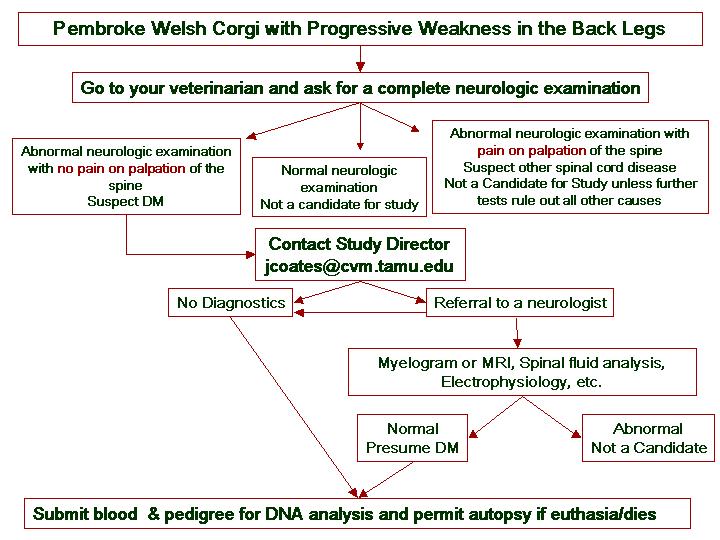DM = Degenerative Myelopathy >>>>
Här kan ni se testade cardigans
![]()
Här kan ni beställa ett DM test: OFFA
![]()
![]()
Här kan man läsa lite mer om DM: College of veterinary medicine
![]()
Här kan ni läsa mer om Merlin som fått diagnosen DM: Merlins blogg
![]()
Fler sidor om DM på svenska:
http://hunddna.slu.se/projekt/dm.html
http://friskafrallor.info/frallor_dm.html
http://www.diamondswolfeyes.com/sida16.html
University of
Missouri
College of Veterinary Medicine

Degenerative Myelopathy
This site is here to provide information on degenerative myelopathy for dog owners and veterinarians interested in the disease and to facilitate an investigation into the cause of the disease. For specific advise on treating and diagnosing diseases in your pet: SEE YOUR VETERINARIAN. If you are a veterinarian with a client that wishes to participate in the Degenerative Myelopathy Project, please contact us for details.
What is Degenerative Myelopathy?
Degenerative myelopathy (DM) is a progressive disease of the spinal cord in older dogs. The breeds most commonly affected include German Shepherds, Welsh Corgis, Irish Setters, and Chesapeake Bay Retrievers. The disease has an insidious onset typically around 9-11 years of age. It begins with ataxia: a loss of coordination in the hind limbs. The affected dog will wobble when walking, knuckle over or drag their feet, and may cross the feet. As the disease progresses, the limbs become weak and the dog begins to buckle at the knees and have difficulty standing. The weakness gets progressively worse until the dog is unable to walk. They may ultimately lose continence and function in the front limbs.

|
| Degenerative
myelopathy is a progressive disease of older dogs resulting in weakness and paralysis. Degeneration of the spinal cord in the middle of the back interferes with the communcation between the brain and hind limbs. |
The exact cause of DM is unknown. Genetics probably plays an important role in the disease since it is common only in certain breeds of dogs and follows a stereotyped pattern. Various infectious, immune mediated, and nutritional theories have been investigated, but no definitive cause has been found.
We do know that the disease begins with the spinal cord in the thoracic (chest) area. If we look under the microscope at that area of the cord from a dog who has died from DM, we see degeneration of the white matter of the spinal cord. The white matter contains the fibers that transmit movement commands from the brain to the limbs and sensory information from the limbs to the brain. This degeneration consists of both demyelination (stripping away the insulation of these fibers) and axonal loss (loss of the fibers themselves).
How is DM diagnosed?
DM is a diagnosis of elimination. That is we look for other causes of the weakness and when we have ruled them out, we end up with a tentative diagnosis of DM. The only way to confirm that suspicion, however, is to examine the spinal cord under the microscope when a necropsy (post-mortem exam) is performed. There are characteristic degenerative changes in the spinal cord, which tell us this is DM and not some other spinal cord disease.
What else can cause similar symptoms?

|
| Further tests,
such as a myelogram, CT or MRI scan, or a spinal tap may be necessary to rule out other causes of weakness |
Any disease that affects the dog's spinal cord can cause similar signs of loss of coordination and weakness. Since many of these diseases can be treated effectively, it is important to pursue the tests necessary to be sure that the dog doesn't have one of these diseases. The most common cause of hind limb weakness is herniated intervertebral disks (slipped disks). The disks are shock-absorbers between the bones of the back. When they herniate, they can cause pressure on the spinal cord and weakness or paralysis. All of the short-legged dogs (Welsh Corgi, Dachshund, Basset Hound, etc.) are prone to slipped disks. A slipped disk can usually be detected with special X-rays of the spine (myelogram), but sometimes more advanced studies such as a CT or MRI scan are necessary. Even dogs with severely slipped disks can often be helped with surgery if diagnosed early.
Infections of the spinal cord can also cause weakness or paralysis. A spinal tap, usually taken at the time the myelogram is performed, can help detect inflammation of the spinal cord. Other diseases we consider include tumors, cysts, injuries and strokes. The combination of myelogram, spinal tap, and possibly CT or MRI allow us to diagnose most of these diseases.
There are no treatments that have been clearly shown to stop or slow the progression of the disease. There are a number of approaches that have been tried, and we continue to look for new treatments. However, the outlook for a dog with DM is still grave. Things that can improve the quality of life for the dog include good nursing care, physical therapy, pressure sore prevention, aggressive treatment of urinary infections, and sometimes carts or harnesses to improve mobility. For information about suppliers of these aids, click HERE.
What is the Degenerative Myelopathy Project?
The Degenerative Myelopathy Project is a collaboration between investigators in Veterinary Schools at four Universities: Texas A&M, Missouri, Ohio State and North Carolina State funded by the Pembroke Welsh Corgi Club of America and the AKC Canine Health Foundation. Under the leadership of Dr. Joan Coates, each school brings a different set of strengths to bear on the problem. The aims of the project are to 1) characterize the disease in Pembroke Welsh Corgis, 2) test theories about the cause of the disease, 3) estimate the incidence in the breed, and 4) collect DNA and pedigree information for genetic studies.

|
| Share this flow
chart with your veterinarian to help decide if your dog is a candidate for the study. |
If you are a veterinarian with a patient with DM, please CONTACT US for details on how you can participate in the study.
But my dogs don't have DM, why do you want DNA from them?
When searching for a mutation responsible for a disease, we need to look for differences between affected dogs and normal dogs. Thus unaffected dogs that are related to an affected dog are just as important as the affected dogs in the search for the gene.
THE IDENTITY OF DOGS WILL BE KEPT STRICTLY CONFIDENTIAL!
Contact us:
If you can help in the search for answers to this problem or have any
questions about the project, please
contact us.
We cannot advise pet owners how to treat your pet's illness. For that advice,
you should see your veterinarian.

|
| Your veterinarian
is the person to ask what's best for your pet. |
To ask questions about the project or to help with the search for answers to
this disease,
contact us:
Contact us
If you have questions about the Degenerative Myelopathy Project or think you can help with the search for answers to this problem, please contact us. We cannot make specific recommendations for the diagnosis or treatment of your individual pet. For those recommendations, you should see your veterinarian. We can help arrange additional diagnostic test if you and your veterinarian think your dog may have degenerative myelopathy. If you have a dog with suspected Degenerative Myelopathy, we would like to discuss how you can contribute to the investigation.
Dr. Coates or Dr. O'Brien can answer questions from veterinarians and help arrange for diagnostic tests. Liz Hansen will coordinate DNA sample collection. Dr. Sylvia Lueck represents the PWCCA in this project
Dr. Joan Coates
University of Missouri
Phone: (573)882-7821
Fax: (573)884-5444
Email: coatesj@missouri.edu
Dr. Sylvia Nolan
Genetics Committee PWCCA
Phone: (360) 455-0799
Email: Trengate@MSN.com
Dr. Dennis O'Brien
University of Missouri
Phone: (573)882-7821
Fax: (573)884-5444
Email: OBrienD@missouri.edu
Liz Hansen
University of Missouri
Phone: (573)884-3712
Email: HansenL@missouri.edu
![]()